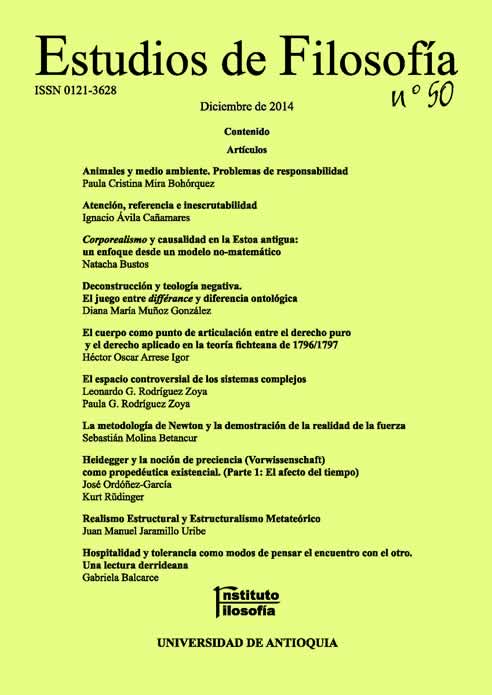Animals and environment: Problems of responsibility
DOI:
https://doi.org/10.17533/udea.ef.21136Keywords:
responsibility, animals, environment, nature, EthicsAbstract
This article aims to revise the concept of moral responsibility to animals and the environment. For this purpose, some necessary revisions to the concept of moral responsibility are taken up again, such as the possibility to understand a partial concept of responsibility and the necessity to be able to make individuals and collectives morally responsible. These concepts are accounted for in a differential analysis between the moral responsibility to animals and to nature.
Downloads
References
Bekoff, M. (2012, Septiembre). Animals are conscious and should be treated as such. New Scientist. Recuperado de http://www.newscientist.com/article/ mg21528836.200-animals-are-conscious-and-should-be-treated-as-such. html#.UxS3DON5Puo
Benhabib, S. (1992). Situating the self: Gender, community, and postmodernism in contemporary ethics. New York: Routledge.
Blackburn, S. (2001). Being Good. A Short Introduccion to ethics. Oxford, New York, Athens: Oxford University Press.
Francione, G. L. (2000). Introduction to animal rights: Your child or the dog? Philadelphia: Temple University Press.
Frankfurt, H. (2006). La importancia de lo que nos preocupa. Filosóficos. Buenos Aires: Katz. DOI: https://doi.org/10.2307/j.ctvm7bf40
Jamieson, D. (2005). Cuándo deberían los utilitaristas ser teóricos de la virtud. Isegoría 32, pp. 9-34. DOI: https://doi.org/10.3989/isegoria.2005.i32.435
Kreide, R. (2007). Justicia global, pobreza y responsabilidad: ¿tienen obligaciones las empresas transnacionales? En: Cortés, R. F., Giusti, M., Justicia global, derechos humanos y responsabilidad. Bogotá: Siglo del Hombre - Universidad de Antioquia - Universidad Católica del Perú.
Midgley, M. (1984a). Animals and why they matter. Athens: University of Georgia Press.
Midgley, M., & Izquierdo, J. (2002b). Delfines, sexo y utopías: Doce ensayos para sacar la filosofía a la calle. Madrid: Turner.
Mill, J. S. (2002). The basic writings of John Stuart Mill. New York: Modern Library.
Nihlén Fahlquist, J. (2008, November 22). Moral Responsibility for Environmental Problems -Individual or Institutional? Journal of Agricultural and Environmental Ethics, 22(2), 109-124. doi:10.1007/s10806-008-9134-5. DOI: https://doi.org/10.1007/s10806-008-9134-5
Platts, M. (2012). Ser responsable. Exploraciones filosóficas. México D.F.: UNAM.
Riechmann, J. (2005a). ¿Cómo cambiar hacia sociedades sostenibles? Reflexiones sobre biomímesis y autolimitación. Isegoría 32, pp. 95-117. DOI: https://doi.org/10.3989/isegoria.2005.i32.459
___________ (2005b). Trilogía de la autocontención. Todos los animales somos hermanos. Ensayos sobre el lugar de los animales en las sociedades industrializadas. Madrid: Los libros de la Catarata.
Sapontzis, S. F. (1987). Morals, reason, and animals. Philadelphia: Temple University Press.
Scheffler, S. (2001). Boundaries and allegiances: Problems of justice and responsibility in liberal thought. Oxford: Oxford University Press. DOI: https://doi.org/10.1093/0199257671.001.0001
Wolf, U. (2008). Die Mensch-Tier-Beziehung und ihre Ethik. En: Wolf, U. (Ed.), Texte zur Tierethik. (pp. 170-192). Stuttgart: Reclam.
_______(2012). Die Ethik der Mensch-Tier-Beziehung. Frankfurt am Main: Klostermann, Vittorio.
Published
How to Cite
Issue
Section
Categories
License
Copyright (c) 2014 Paula Cristina Mira Bohórquez

This work is licensed under a Creative Commons Attribution-NonCommercial-ShareAlike 4.0 International License.
Authors who publish with this journal agree to the following terms:
1. The Author retains copyright in the Work, where the term "Work" shall include all digital objects that may result in subsequent electronic publication or distribution.
2. Upon acceptance of the Work, the author shall grant to the Publisher the right of first publication of the Work.
3. The Author shall grant to the Publisher a nonexclusive perpetual right and license to publish, archive, and make accessible the Work in whole or in part in all forms of media now or hereafter known under a Creative Commons Attribution-NoCommercia-ShareAlike (CC BY-NC-SA 4.0), or its equivalent, which, for the avoidance of doubt, allows others to copy, distribute, and transmit the Work under the following conditions: (a) Attribution: Other users must attribute the Work in the manner specified by the author as indicated on the journal Web site;(b) Noncommercial: Other users (including Publisher) may not use this Work for commercial purposes;
4. The Author is able to enter into separate, additional contractual arrangements for the nonexclusive distribution of the journal's published version of the Work (e.g., post it to an institutional repository or publish it in a book), as long as there is provided in the document an acknowledgement of its initial publication in this journal;
5. Authors are permitted, and Estudios de Filosofía promotes, to post online the preprint manuscript of the Work in institutional repositories or on their Websites prior to and during the submission process, as it can lead to productive exchanges, as well as earlier and greater citation of published work (see The Effect of Open Access). Any such posting made before acceptance and publication of the Work is expected be updated upon publication to include a reference to the Estudios de Filosofía's assigned URL to the Article and its final published version in Estudios de Filosofía.















